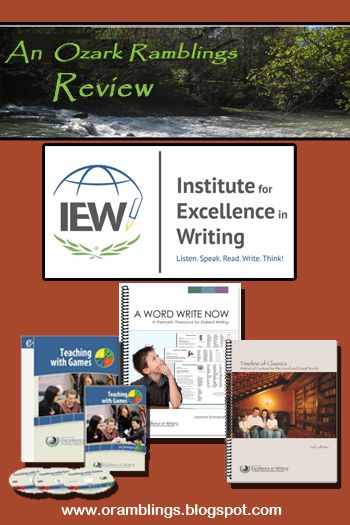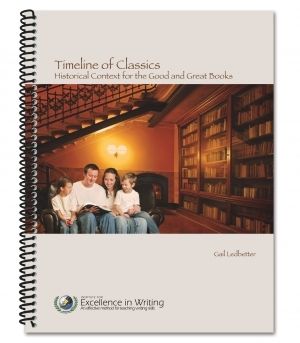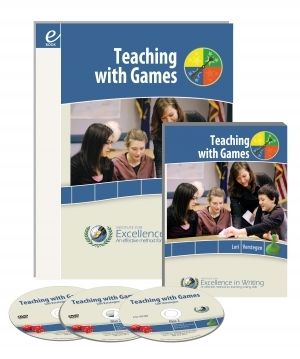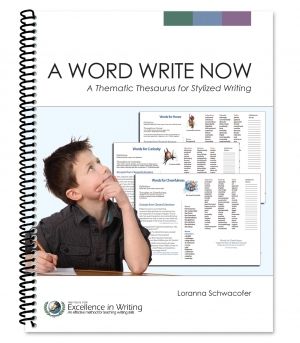
After years and years of reviewing homeschooling curriculum and products, I can only count on one hand the number of vendors from whom I’d accept any product, just know it’s going to be good. The Institute for Excellence in Writing is one of those vendors. Every time we’ve reviewed a product, it has become a permanent part of our schooling. I’ve been using their Structure and Style writing program since my son was in first grade. A few years later came the Literature Analysis course and most recently was their Grammar program. This time, the products we received aren’t curriculum themselves, but resources to enhance or supplement homeschool studies—and not just in the area of language arts..
We received a spiral bound book for all three titles. The Teaching with Games set also included two DVD’s and a CD-ROM.

There are over ninety pages of charts in Timeline of Classics, each giving the Description or Time Period, the Title, the Author, and the appropriate age level of the resources. I use the word “resources” because you will find much more than books listed. I’ve also come across audios, movies, magazines, television shows, etc. A lot of listings have “Compact Classics” listed with the title—a little research determined this book provides two page summaries of many “classic” books.
I would say this book provides a jumping off place if you’d like to add books or movies to your study of a period of history. There is no synopsis of any title so you’d still need to do some research to see if the title is going to meet your needs. For example, since we were in the middle of studying ancient Egypt, I went to that section. There I found listings for Motel of the Mysteries (which I happen to know is a spoof of Howard Carter’s discovery of King Tut’s tomb) and the Cecil B DeMille version of The Ten Commandments. I wouldn’t consider either resource for a serious study of ancient Egypt, but the might make for some family fun time to celebrate wrapping up our study. Often you’ll find a title in more than one format, for example most of the G.A. Henty books list the original book and the audio versions available.
Of the three books I received, this is the on I use the least. If a book is worthy of being called a classic, then we will read the original (even if I have to read it aloud). I’m not interested in two-page summaries or film adaptations. I will keep the book with my other reading list resources because it does have a very thorough chronological list.

This year I’m help to teach a high school level biology co-op class. We’re alternating labs with review sessions to prepare for tests. What better tool for making reviews fun than the Teaching with Games Set. The book gives instructions and often samples of games that require No Prep, versions of Flash Cards, asking Questions, drilling math facts, and games the students build themselves throughout the study.
I happen to learn best by having someone teach me as we actually play the game rather than reading the rules. If you’re like me then you’ll want to get the DVD which shows a round of each game being played. The CD-ROM has a PDF version of the book (so you can print your own copies of the sample games) and some bonus grammar games.
For our science co-op I’ve found the Hot Potato card game to be a great way to go through vocabulary terms. Both the clue giver and the one shouting out the answer have to know the definition of the term so they can pass on the stack of cards before time runs out. Other times we’d play a simplified version of Jeopardy or a game called The Question Bag when we needed to review information that required more than a one word answer.
The introduction in both the DVD and the book share how students are more likely to be motivated to learn when it’s done through a game. I totally agree and can share my own story. My son is the youngest student in science co-op—he’s only 12 but is taking this high school level course because he’s mathematically ready for it. He has, however, won 4 out of 5 of the study games we’ve played thus far because he’s very, very motivated to win (winners get $5 gift cards to local stores and restaurants)—even if that means spending a lot of time with his nose in a science book.




No comments:
Post a Comment